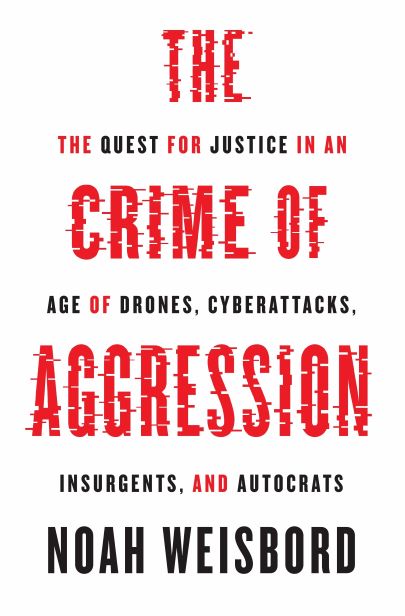August 19, 2019
On 15 December 2017, States Parties to the Rome Statute, meeting in New York, agreed to activate the ICC’s jurisdiction over the crime of aggression. For the first time since the Nuremberg and Tokyo tribunals, it will be possible to hold leaders individually responsible for waging wars of aggression. Professor Noah Weisbord is a (if not the) leading authority on the crime of aggression under international law. Among several notable publications, his recent The Crime of Aggression: The Quest for Justice in an Age of Drones, Cyberattacks, Insurgents, and Autocrats (Princeton University Press) is a remarkable insider’s account of the historical efforts to criminalize wars of aggression. The following is an interview, conducted by email, in which he shares his insights into some of the central issues surrounding this fourth crime under the ICC Statute.
1. What is the crime of aggression?
In December 2017, the crime of aggression was activated to deal with the problem of leaders intent on illegal war. It took its place alongside genocide, crimes against humanity and war crimes as a pillar of international criminal law. Under the crime, individual leaders can be prosecuted if they perpetrate acts of aggression including invasion, bombardment, blockade and armed attacks on another state’s forces. Two clear-cut examples of acts of aggression are Saddam Hussein’s 1990 invasion of Kuwait and George W. Bush’s 2003 invasion of Iraq. The newly activated crime is based on the United Nations Charter and customary international law, both binding on all states. It empowers domestic and international courts to make principled, not political, determinations on whether a war is legal or illegal.
2. How did international law on the use of force look before aggression was activated in December 2017 as a prosecutable crime at the International Criminal Court?
Under the old legal regime, states are responsible for judging other states. Their decisions are influenced by politics as much as principles. The UN Security Council, a political body consisting of five permanent members—Britain, China, France, Russia, and the United States—and ten elected members sitting for two-year terms, has primary responsibility for determining whether aggression has occurred, and for mustering a collective response. Any one of these states, granted permanent seats on the council after World War II, can veto a decision of the other fourteen members of the council at will and without justification, leading to seventy years of chronic deadlock and biased decision making. Five powerful nations control determinations of aggressive war in a political process that favors the aggressors, leading victims of international aggression to conclude that the system is rigged.
The revival of the crime of aggression--originally used to prosecute the Nazi leaders at Nuremberg after World War II but put on deep freeze by the superpowers during the Cold War--is an overdue response to deepening dissatisfaction with the way wars are started and judged. Particularly frustrating is international law’s emphasis on collective responsibility of states rather than individuals, its reliance on a biased political process to judge wars, and patchy enforcement. After a century of failed attempts and false starts, the impulse to hold individuals accountable for aggressive war resurfaced after the US-led invasion of Iraq, and, even more surprisingly, gained newfound traction. It emerged alongside preexisting, competing practices for managing interstate conflict, such as negotiation, collective security, and balance of power.
The crime of aggression is a legal response to the frustrating deficiencies of the old regime. In regulating the individual, the new law has the potential to make international law fairer and more effective. The crime of aggression responds to loss of faith in the Security Council’s politicized decisions and to demands that justifications for armed force be tested against a universal standard by impartial judges. International, regional, and domestic courts are meant to serve as a check on the frivolous claims of leaders who would frighten their populations with vague threats to their safety or the safety of others in order to justify aggressive war. Approximately forty states and a number of regional organizations have already incorporated aggression into their criminal codes.
3. Realistically, is anyone ever going to be tried for the crime of aggression?
Yes. The end of the Cold War has led to new potential for arrests, specifically the proliferation of overlapping spheres of local, national, regional, international and transnational police authority. New purveyors of nonstate military force such as private contractors have created new enforcement possibilities. States can arrest perpetrators on their territory, peacekeepers can arrest, and private contractors have made spectacular arrests of war criminals abroad. I have an action-packed chapter on the successful arrest of leaders for international crimes in my new book. My hope is that Canada will become a leader when it comes to coordinating arrests.
My prediction is that the first aggression cases of powerful Western leaders will be self-referrals, like the first ICC cases for war crimes and crimes against humanity were. The government of the Democratic Republic of Congo and Uganda referred their own territories to the ICC to investigate crimes by all sides in an effort to forestall endless cycles of violence and reprisals. Imagine President Cory Booker, Kamala Harris, Bernie Sanders or Elizabeth Warren referring crimes by the Trump administration to the ICC. Perhaps even better, imagine Congress incorporating these crimes into domestic U.S. law and U.S. courts prosecuting U.S. leaders for violations.
The Iraq War Inquiry in the UK, where Tony Blair and others were grilled on the legality of the Iraq War and their own accountability, was a kind of dress rehearsal.
 4. Your book is written for a broad audience, people interested in current affairs. Why should they be interested?
4. Your book is written for a broad audience, people interested in current affairs. Why should they be interested?
The crime of aggression provides domestic and international courts with a powerful check on authoritarian power. Authoritarian leaders worldwide are successfully undermining the democratic checks and balances on their discretion to wage war. Proponents of the rule of law have been struggling to address this alarming situation and the crime of aggression provides a potential response.
Although international law may sometimes seem meaningless as a means of opposing powerful leaders, it is the most reliable set of objective standards for checking unbridled greed and nationalism. By setting benchmarks for behavior, and rules of evidence and procedure, it allows government officials, lawmakers, courts, media, and civil society to evaluate the legality of their leaders’ propaganda for waging war. The rule of law is the most effective resistance tool to sway institutions and to keep authoritarian leaders in check.
5. Your book is a character-based account of the crime of aggression. Are there heroes and villains in the story?
There certainly are. A recurring character is former Nuremberg prosecutor Benjamin Ferencz. After the Second World War, Ferencz had prosecuted the Einsatzgruppen Case, a trial of twenty-two Nazi death-squad leaders who had killed over a million victims and claimed self-defense. Ferencz spent the rest of his life campaigning to create a permanent ICC modeled on the Nuremberg precedent, capable of punishing leaders who committed any of the four core international crimes: genocide, war crimes, crimes against humanity, and aggression.
For Ferencz, a proud American, the US invasion of Iraq, based on falsified information about a future attack, signaled a Bush administration campaign to undermine international law. He told me that lying to justify war and exempting American leaders from the Nuremberg precedent were shortsighted hypocrisy. If legal accountability was not equally applied to all, Ferencz believed it would undermine the rule of law and destroy the world.
Another character is Harold Koh, Legal Advisor of the US Department State under President Obama. Koh had been a leading US human rights scholar before joining the State Department. During the George W. Bush presidency, Koh had spoken eloquently against torturing suspected terrorists. But under Obama, he drafted legal opinions justifying the elimination of terrorists by drones. Koh also attempted to stymie the aggression negotiations.
Reactions to Koh’s time in the Obama administration were mixed, ranging from attacking him for breathing new life to the global war on terror to hailing him for trying to bring an end to the Forever War. When NYU hired Koh to teach international human rights, students circulated a petition demanding the university disassociate itself from him, calling him “a key legal architect of the Obama Administration’s extrajudicial killing program.” Allies countered that Koh fought to bring US policy in line with domestic and international law, and that without him things would have been worse.
6. Are you happy with how the crime was finally defined? What would you have changed if you could?
Considering the barrage of sophisticated attacks on the drafting project by powerful states including the U.S.—and unfortunately by the Canadian delegation at the moment of activation—I’m happy with the final result. But I’m under no illusion. The definition of the crime of aggression will face countervailing criticisms: that it is rigidly anachronistic and that it is dangerously vague. There is some truth to each criticism.
In order to generate wide support for the final product, the crime was built from existing international law and past precedent. It was based on the Nuremberg precedent, the UN Charter, the 1974 General Assembly Definition of Aggression, and other uncontroversial sources. Building from prior agreements was a good way to insulate the definition from capture by militarily powerful states, but the risk is that the crime will not effectively encapsulate new types of aggression. These include drone strikes and cyberattacks, which are difficult to attribute.
I’m especially concerned by the narrow focus of the crime on political and military leaders of states. Warfare is changing and states are no longer the only purveyors of armed force. The drafters of the crime were forced to accept painful compromises, such as the exclusion of explicit language capturing nonstate aggressors such as Osama bin Laden in the definition of the crime, in order to reach a consensus.
For the crime of aggression to capture non-state aggressors, judges interpreting the law will need to be forward looking. Their challenge will be to use precise language so that the law evolves incrementally and specifically without becoming dangerously amorphous.
7. The Crime of Aggression was recently reviewed in The Literary Review of Canada, which said it was “as masterful an account of the century of legal toil dedicated to corralling the human urge to wage war as has yet found two covers.” The reviewer compared it to The Decameron. Can you explain the comparison?
The Decameron is a playful collection of stories written by Giovanni Boccaccio in 14th century Italy. It includes tales of love, practical jokes, and tragic life lessons told by ten young women and men holed up in a villa outside Florence trying to escape the black plague.
I think Brendan Howley, who wrote a gorgeous, thought provoking review, makes the comparison because The Crime of Aggression was also written as a web of parables, observations and case studies, with a narrative arc. The book is a genre-bending coming of age story--of me, Ben Ferencz, or maybe international law.
As David Scheffer, another reviewer, observed, I’m attempting to put a human face on the crime of aggression—on those who commit it, and those struggling to use law as a principled constraint on war. My larger hope is that the crime of aggression, and my book, will help invigorate the peace movement by turning the spotlight on leaders who would bring us to war.
Please cite this book interview as Book Review: Payam Akhavan Interviews Noah Weisbord About his Book “The Crime of Aggression: The Quest for Justice in an Age of Drones, Cyberattacks, Insurgents, and Autocrats”, (2019) 3 PKI Global Justice Journal 64.
_____________________________________________
 Payam Akhavan is Professor of International Law at McGill University and former UN prosecutor at The Hague. He is currently counsel to Bangladesh in the International Criminal Court case concerning the Rohingya. He is author of the 2017 CBC Massey Lectures, “In Search of a Better World: A Human Rights Odyssey,” published by the House of Anansi Press.
Payam Akhavan is Professor of International Law at McGill University and former UN prosecutor at The Hague. He is currently counsel to Bangladesh in the International Criminal Court case concerning the Rohingya. He is author of the 2017 CBC Massey Lectures, “In Search of a Better World: A Human Rights Odyssey,” published by the House of Anansi Press.
 Noah Weisbord is an Associate Professor at Queen's Law. His research focuses on the role of the criminal law in managing, reflecting or exacerbating intergroup conflict. A current project examines self-defence in Canadian criminal law from historical, comparative, and conceptual perspectives. Noah is a leading expert on the crime of aggression—individual criminal responsibility for aggressive war—and he assisted diplomatic delegations to define the crime.
Noah Weisbord is an Associate Professor at Queen's Law. His research focuses on the role of the criminal law in managing, reflecting or exacerbating intergroup conflict. A current project examines self-defence in Canadian criminal law from historical, comparative, and conceptual perspectives. Noah is a leading expert on the crime of aggression—individual criminal responsibility for aggressive war—and he assisted diplomatic delegations to define the crime.
Image: Soviet tanks in Berlin 1961, Public Domain (taken by a CIA employee), 27 October 1961. See https://en.wikipedia.org/wiki/Tripwire_force#/media/File:Soviet_tanks_in_Berlin_1961.jpg.